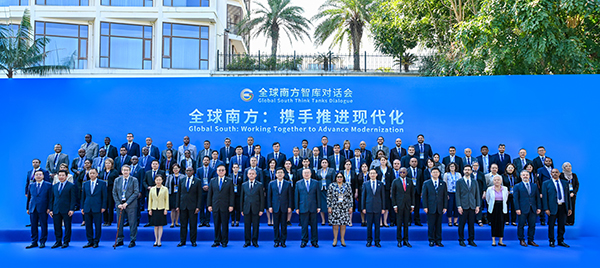

Group photo of participants. [Photo provided to China Daily]
Countries in the Global South should unite more closely, explore modernization tailored to their own circumstances, and work toward establishing a multipolar world order, said experts and officials at a forum in Xiamen, Fujian province, on Nov 2.
Liu Jianchao, minister of the International Department of the Communist Party of China Central Committee, said the Global South serves as the driving force behind the new global order, the foundation of a multipolar world, and the key factor in democratizing international relations.
He said the Global South must unite further, break the "perpetual weakness" spell, free itself from the "modernization equals Westernization" misconception, and resound the strong call for "the path of great harmony, shared prosperity for all" in modernization.
Jointly held by the International Department of the CPC Central Committee, the Fujian provincial government, and the China Council for BRICS Think Tank Cooperation, the Global South Think Tanks Dialogue attracted over 300 participants, including scholars, politicians, business and opinion leaders from more than 50 emerging markets and developing countries such as Brazil, Russia, India, and South Africa.
Nomvula Mokonyane, first deputy secretary-general of the African National Congress, South Africa, said in an era of rapid shifts in geopolitics and global balance of power, the voice of the Global South is gaining prominence in international affairs.
She said the 15th BRICS Summit successfully held in South Africa in August will help establish a more equitable, just, and representative world order, and ensure that the voices of the Global South are no longer suppressed, marginalized, and muted.
Azizi Abdujabbor Abdukahhor, first deputy chairman of the People's Democratic Party of Tajikistan, said the Global South nations have achieved remarkable successes in improving the well-being of their people and advancing their economies.
He said the combined GDP of the BRICS countries now surpasses the total that of the G7 nations; and the BRICS cooperation mechanism, once subject to skepticism, is now widely recognized as an authoritative organization on the world stage.
Fabio El-Khouri, advisor at the International Cooperation Department of the Fundacao Perseu Abramo, Brail, said historically burdened by colonial legacies and economic disparities, the Global South endured centuries of subjugation, resource extraction, and underdevelopment by colonial powers.
However, recent decades have seen a transformative shift, he said. Drawing on their cultural heritage, resilience, and determination, Global South nations have recognized their inherent potential, making substantial progress in technology, education, healthcare, and sustainable development.
"We are no longer passive recipients, but active participants in shaping the future," he said.
China has launched a new pilot program to allow eligible enterprises greater access to overseas financing in support of green and low-carbon transformation projects, the country's foreign exchange regulator said on Aug 21.
To further streamline the experience, China is expanding tax refund stores, broadening the range of refundable goods, and refining refund procedures, ensuring an efficient and seamless shopping experience for global visitors.